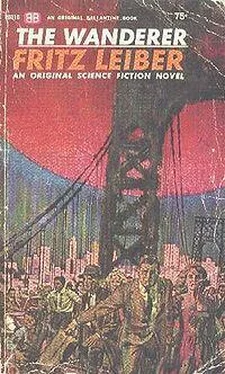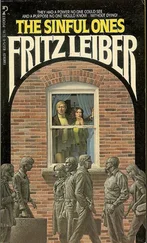Hunter pushed Margo into the Corvette and got in himself, then stood up behind the wheel and honked the horn for attention. He said loudly: “Get into the cars, everybody! Throw our stuff into the back of the truck if anybody wants to, but be quick about it We’re driving into Vandenberg.”
The Stranger gave many who saw it the feeling which Wanda and Mrs. Hixon had voiced — “This is too much. This is the end.” The more scientifically minded of these pessimists noted that the Stranger was near enough to the Wanderer — only about forty thousand miles away if it were the same distance from Earth — so that its gravity would largely augment rather than oppose the great tides the Wanderer had been raising.
But many others were naively delighted by the steely new planet and the exciting rays it shot. For a while, at least, the astronomical spectacle took their minds off their troubles, worries, and even life-or-death problems. In the stormlashed sea somewhere near Florida (horizontally or vertically), Barbara Katz cried out from the cockpit of the “Albatross” to the spirit of old KKK: “ Thrilling Wonder Stories! Oh, but it’s beautiful,” and Benjy shouted to her solemnly: “Sure is a wonder, Miss Barbara.”
“Boy, this second act was a long time coming,” Jake Lesher complained to Sally Harris as they sat once more side by side on the patio, each damp-blanket-wrapped and warmed with a “Hunter’s Friend” and wearing patented hand-warmers for skiers that they’d found among Mr. Hasseltine’s things. “If our play doesn’t move faster, it’ll die in Philadelphia.”
In an untoppled astronomical observatory in the Andes, the seventy-year-old French astronomer Pierre Rambouillet-Lacepede rubbed together his ivory-dark fingers with delight and snatched for pencil and paper. At last, a really challenging instance of the Three Body Problem!
Still others on the night side of Earth didn’t see the Stranger at all because of clouds or other hindrances. Some of them had not even yet seen the Wanderer. Wolf Loner spied a faint yellow light through the overcast that had settled into fog. Sailing closer, he saw it was a kerosene lantern set a few feet above the water in a tall stone window with a round top. When the “Endurance” had come closer still, he saw the narrow wall of yellowish stone and the dark steeple rising above it, and he recognized the place because he had climbed to it more than once, but he could not believe his eyes. He swung the tiller and let go the mainsheet, and the “Endurance” gently bumped the narrow roof below the window. The sail flapped idly, there was no current in the water around the stone structure. He took up the mooring line and stepped out on the roof and through the window, carefully setting aside the lantern, and looked around. Then he could no longer doubt: he was in the belfry of the Old North Church. Standing across from him, backed against the wall as if she were trying to disappear into it, was a dark-haired, Italian-looking girl of perhaps twelve who stared at him, her teeth chattering. She did not respond to his questions, even when he phrased them in scraps of Italian and Spanish, except to shake her head, and that might only have been a kind of shivering. So after a time, still holding the mooring line, he went close to her, and although she shrank from him he took her up gently but firmly and carried her out the window, carefully replacing the lantern on the sill, and stepped with her into the “Endurance” and set her down halfway into the narrow cabin and put a blanket around her. He noticed the water was moving a little now in the direction from which the sailing dory had come. So with one thoughtful headshake downward, toward where Copps Burying Ground would be, he brought the “Endurance” about and, taking advantage of the outgoing tide, set sail out of Boston’s North End for the open sea.
With unintended diabolic precision the four insurgent captains atom-steamed the “Prince Charles” into the Pororoca. This tidal bore of the Amazon is normally a mile-long waterfall five yards high, which travels upstream at fifteen miles an hour with a roar that can be heard ten miles away. Now it was a great seething slope half as high as the “Prince Charles” was long and carrying that great city of a ship — a smaller Manhattan Island — canted forward at an angle of twenty degrees, up the mightiest of rivers, now Wanderer-swollen and Stranger-swollen, too. All around, the hurricane roared with the Pororoca and its waves augmented the bore. To the east the storm completely masked the dawn. Ahead to the west was a wilderness of darkness and torn clouds. At this moment Captain Sithwise reached the bridge — a counter-coup having met no opposition whatever in the period of cataclysm — and he took the wheel and began to send orders to the atomic engine rooms. At first he guided the ship by the slant and gleam of the Pororoca, but then — since they hung to starboard brightly and firmly, through the whirling cloud wraiths — he began to depend somewhat on the beacon globes of the Stranger above and the Wanderer below.
Paul and Don stared up at the blank Stranger and the moon-girdled Wanderer through the transparent ceiling of Tigerishka’s saucer, poised five hundred miles above Vandenberg Two.
The artificial gravity field was still on, so they were sprawled on the floor of the saucer. This was transparent also. Through it they could see, by sunlight reflected from the two planets that had erupted from hyperspace, the dark expanse of Southern California, here and there invaded by the dim silver of the sea, and for the other half of the floor-picture the relatively bright expanse of the Pacific itself, though both sea and land were somewhat blurred by the layers of Earth’s atmosphere.
There was one obstruction in this lower picture. From the now-invisible port in the center of the transparent floor, the thick worm of the space tube stretched off to the side, where presumably the Baba Yaga hung out of view. The reflected light from the Stranger and the Wanderer, striking through the two rigid transparencies, gleamed on the ridged metal of the tube outside and in, showing the first two of the inner handholds by which a being in free fall could pull himself through the tube.
Both Paul and Don avoided looking down. The artificial gravity field, although Tigerishka had assured them it extended only inside the saucer, made the depths below distinctly uncomfortable.
They had the same view as did those approaching Vandenberg of the Stranger and the Wanderer, except that for Paul and Don the two planets were much brighter, and were backgrounded not by slate-gray sky but by the star-spangled black of space.
The sight was weird, arresting, even “glorious,” yet because of their knowledge of the underlying situation, however partial and fragmentary, Paul and Don felt chiefly an ever-mounting tension. There above them hung the Pursued and the Pursuer, Rebellion and Authority, Adventure and Restraint — hung in the stasis of an uncertain truce, while the two orbs watched and measured each other.
The bulge-sided yellow triangle in the purple needle-eye face of the Wanderer and the bright solar highlight in the vaster, gibbous, gunmetal round of the Stranger were two great eyes staring each other down.
The tension was deadly, shriveling. It made Don and Paul, despite the support of each other’s presence, want to shrink out of sight, want to sink down, down, down through the layers of Earth’s atmosphere and rocky, maternal flesh to some lightless womb. Even the eagerness of any eye to watch such wonders hardly balanced in them with this urge.
Paul asked in an almost childish voice: “Tigerishka, why haven’t you gone back to the Wanderer? It’s been a long while since the Red Recall flashed. All the other ships must have gone.”
Читать дальше










